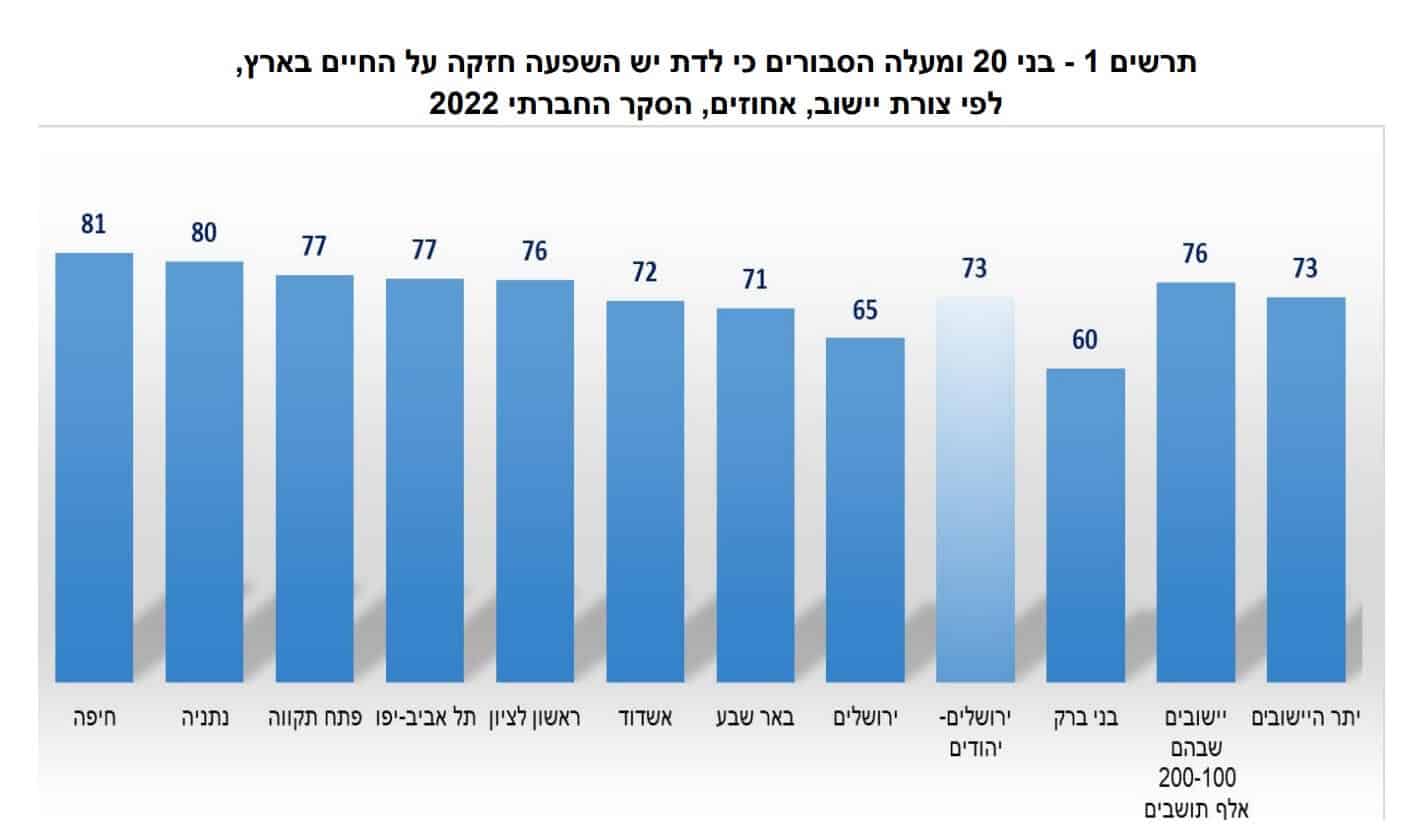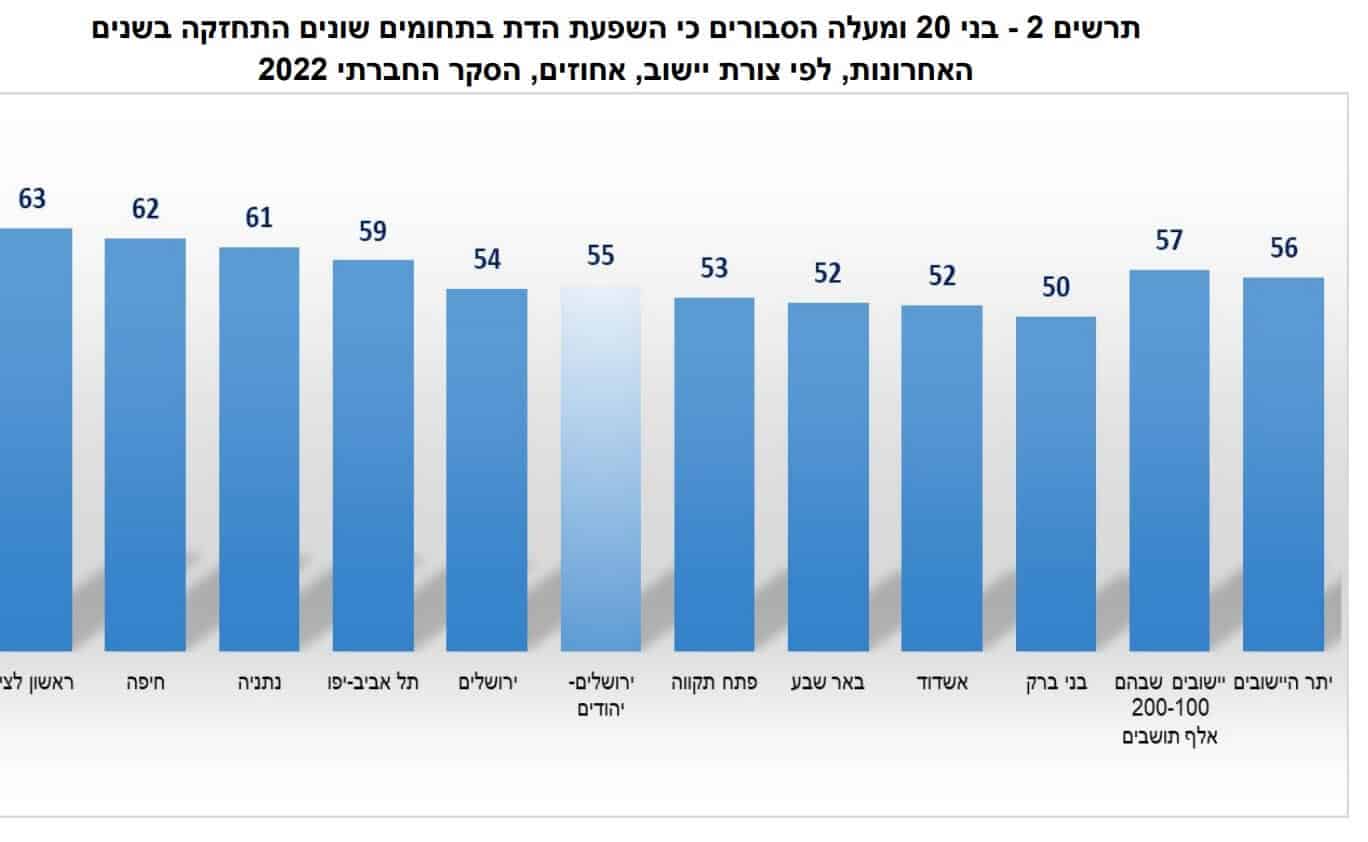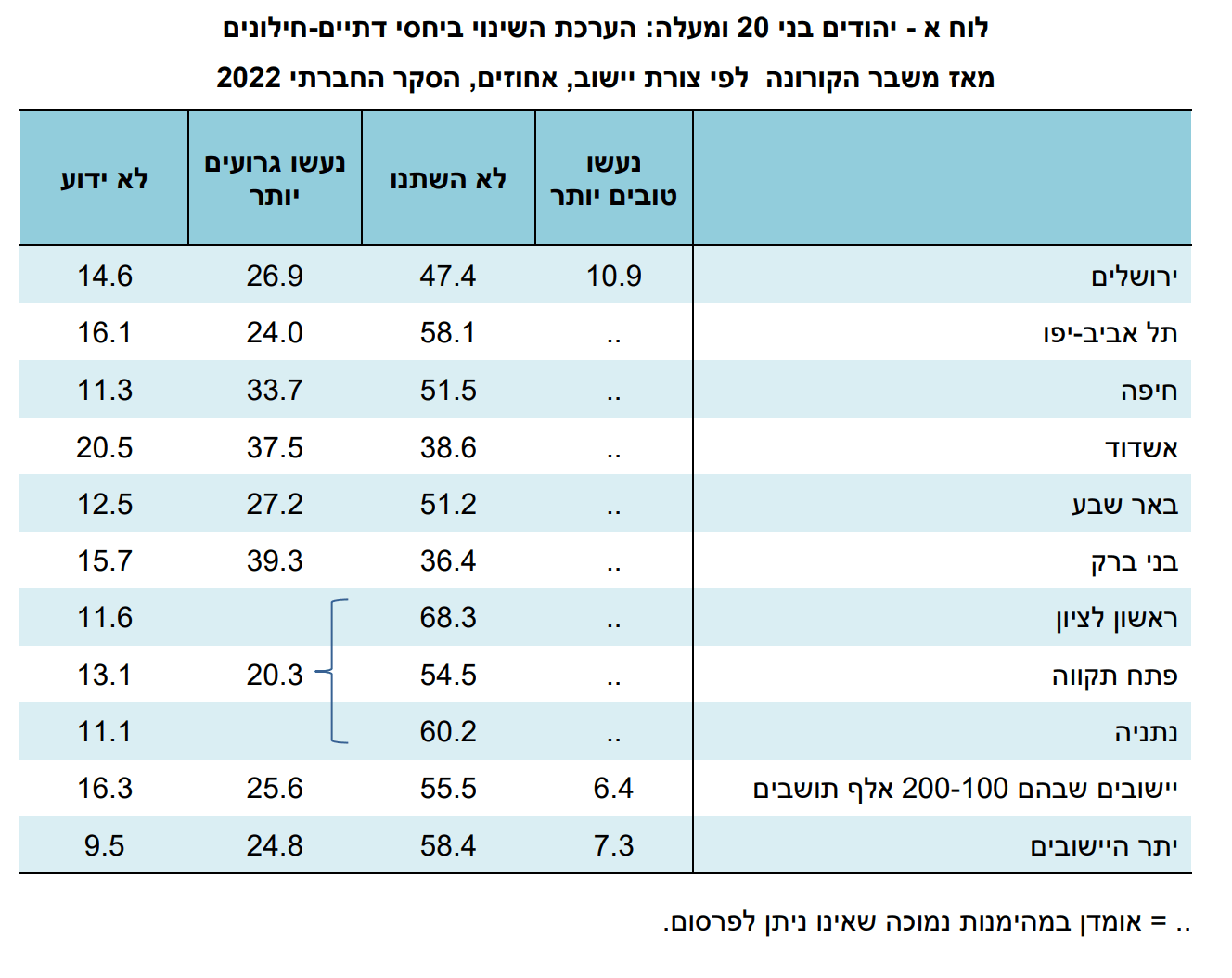This is according to data collected from the 2022 social survey on attitudes regarding the influence of religion
The social survey has been conducted by the Central Bureau of Statistics, every year since 2002. The survey provides information on the living conditions of the Israeli population on the following subjects: housing, automobiles, health, education, internet use, employment, vacations, contact with family and friends, voluntary activities, situation economic, satisfaction and trust.
In 2022, the survey dealt with the occupational, social and economic consequences of the corona crisis, the influence of religion, the perception of democracy and the perception of the media.
As part of the 2022 social survey, 6,501 people aged 20 and over were interviewed, representing approximately 5.8 million people of that age. The interviews were conducted from January 2022 to January 2023. The survey population is the permanent population of the State of Israel aged 20 and over living in households.
In 2022, the Bedouins in the Southern District and Arab settlements from the Central Districts and Jerusalem (with the exception of Arabs from the city of Jerusalem) were not included in the survey population due to difficulties in collecting the data.
among those aged 20 and over To what extent does the public agree that "Religion has a strong influence on life in Israel"
Most of the public, 73% which is about 4.28 million people, agree with this statement - 32% 'strongly agree' and 41%
'Agree,' 15% do not agree so much and 7.7% - do not agree at all.
77% of the Jews and the others 2 'agree very much' או 'Agree,' compared to 52% of the Arabs. Lesson who agree very much among the Jews: 36% of the ultra-orthodox, 26% of the religious, 24% of the traditional and 43%
from the secular The percentage of those who think so in the big cities (with 200,000 inhabitants or more) ranges between 81% in Haifa and
60% in Bnei Brak.
Chart 1 - 20-year-olds and older who believe that religion has a strong influence on life in Israel,
according to form of settlement, percentage, The social survey 2022
1. The answer options are: 1. Strongly agree/agree. 2. Agree/agree. 3. Not so much agree/agree. 4. Not at all agree/agree.

"The influence of religion in various fields has strengthened in recent years"
20% 'strongly agree', 36% 'agree' (about 3.3 million people), 22% not so much agree and 15% - not at all
agree
57% of Jews and 52% of Arabs strongly agree or agree.
47% of the ultra-orthodox, 44% of the religious, 54% of the traditional and 67% of the secular 'strongly agree' or 'agree' that
The influence of religion grew stronger. The proportion of those who think so in the big cities (with 200,000 or more residents) varies between 63% in Rishon Lezion
and 50% in Bnei Brak.
Chart 2 - 20-year-olds and older who believe that the influence of religion in various fields has strengthened over the years The latest, by type of settlement, percentages, the 2022 social survey
"In the state Israel should separate religion and state"
among The Jews
30% 'strongly agree' and 19% - 'agree' - about 2.3 million people, 15% not so much agree and 30% - not at all
Agree with the statement. Among the Jews: 13% of the ultra-Orthodox, 17% of the religious, 28% of the traditional-religious, 43% of the not so traditional
Religious and 75% of seculars 'strongly agree' or 'agree' that religion and state should be separated.

"Religious-secular relations since the Corona crisis"
among Jews
6.7% believe that since the Corona crisis, religious-secular relations have become better, 56% believe that they have not
have changed, 26% believe that relations have become worse (about 1.2 million people).
10% of the ultra-orthodox believe that relations have gotten better, compared to 2.8% of the secular.
In the big cities, the proportion of those who believe that relations have improved is relatively low, and given the limit of the sample size, it is not possible
for publication.
More than a third of residents of Ashdod (37%) and Bnei Brak (39%) believe that relations have become worse.
Table A - Jews aged 20 and over: assessment of the change in religious-secular relations
since The corona crisis by type of settlement, percentage, The social survey 2022
| No known | got worse | No Have changed | Were done better | |
| 14.6 | 26.9 | 47.4 | 10.9 | Jerusalem |
| 16.1 | 24.0 | 58.1 | .. | Tel Aviv Jaffa |
| 11.3 | 33.7 | 51.5 | .. | Haifa |
| 20.5 | 37.5 | 38.6 | .. | Ashdod |
| 12.5 | 27.2 | 51.2 | .. | Beer Sheva |
| 15.7 | 39.3 | 36.4 | .. | Bnei Brak |
| 11.6 | 68.3 | .. | Rishon Lezion | |
| 13.1 | 20.3 | 54.5 | .. | Petah Tikva |
| 11.1 | 60.2 | .. | Netanya | |
| 16.3 | 25.6 | 55.5 | 6.4 | Localities with 200-100 thousand inhabitants |
| 9.5 | 24.8 | 58.4 | 7.3 | The other settlements |
.. = low confidence estimate that cannot be published.
37% of the ultra-orthodox believe that relations have become worse compared to 18% of the religious, 22% of the traditional and 28% of the secular.
Chart 3 - Jews aged 20 and over: assessment of the change in religious-secular relations since the Corona crisis,

- To the social survey page on the CBS website
- for the 2022 social survey questionnaire
- For the social survey board generator
- Meta data - definitions and explanations
More of the topic in Hayadan:
- A global survey proved: many corona patients experience damage to the senses of taste and smell
- A call to vegetarianism?
- NASA's Mars lander Phoenix was able to transfer the soil samples to the microscope, soil sample collection procedure
- The National Academy of Sciences will hold a "Job Fair" for Israeli researchers abroad
- "Scientists should be open to considering miracles in their theories or explanations. "

4 תגובות
Did you copy-paste from Rose? The RTL is shocking
The information is from the website of the Central Bureau of Statistics according to a survey it carries out every year
The will pay you if you entered incorrect information
Taking a binary question and stretching it into a range of options sounds like fraud